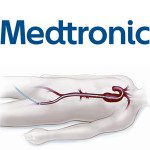Medtronic (NYSE:MDT) said today it enrolled the 1st patient in a clinical study of its Valiant TAAA stent graft system designed as a minimally invasive treatment for thoracoabdominal aortic aneurysm.
The Valiant TAAA stent graft system is designed to operate as an off-the-shelf endovascular solution for patients suffering from aortic aneurysms, which are dangerous bulging or ballooning segments in the wall of the aorta that can cause sudden death if untreated, Medtronic said.
“The mortality rate is 25 percent when treating a thoracoabdominal aortic aneurysm with an open surgical technique, which involves cutting open the aorta. Providing the patient with an option for a less-invasive approach is needed. This procedure marked an important step in the process to obtain FDA approval, and Sanford’s support of such innovation will give hope to patients afflicted with challenging disease states such as this,” Sanford Health’s Dr. Patrick Kelly, the device’s inventor, said in a prepared statement.
Sanford Health holds the IP for the device, covered by an exclusive patent license agreement with Medtronic. Fridley, Minn.-based Medtronic said it plans to study the system in collaboration with physicians at sever medical centers.
“The Valiant TAAA approach allows for the procedure to be staged at any time and lets the operator work on each branch vessel individually. When taking on challenging cases, the device leverages skill sets that are quite routine for vascular surgeons,” Dr. James Black of Johns Hopkins Hospital said in a press release.
“As the 1st patient treated with the minimally invasive Valiant TAAA recovers, we are inspired by the innovators that continue to challenge the limitations of current treatment options. Our mission to improve patient outcomes will drive us into the future as we seek to treat more complex aortic disease,” ,” aortic biz GM Daveen Chopra said in prepared remarks.
In October, Medtronic released follow-up data from the Valor II study of its Valiant stent graft, saying patients with descending thoracic aortic aneurysms showed 94.8% freedom from aneurysm-related mortality at 5 years.
Medtronic, which originally won PMA approval for Valiant in April 2011, said the results show the durability of the Valiant device. The Valor II study, a prospective, single-arm trial involving 160 patients in the U.S., met its primary safety and efficacy endpoints back in 2011 with an overall mortality rate of 12.6% and a 97% success rate at 12 months.


